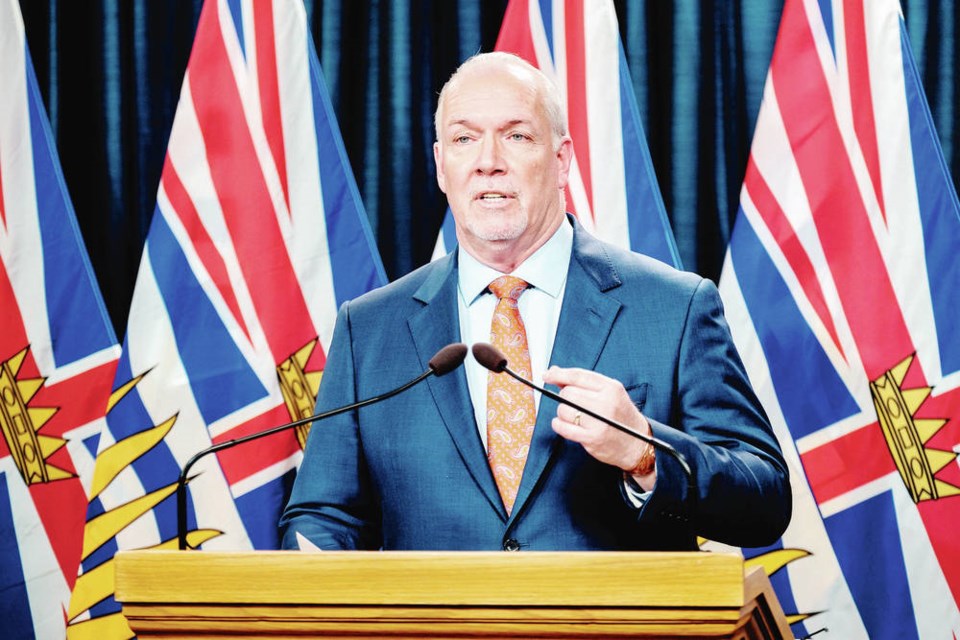After misreading the situation when U.S. politicians first considered dropping the legal requirement that Alaska-bound cruise ships stop in Canada, the B.C. government is now watching something even more serious take shape.
The first idea was enacted and will take effect — against all Premier John Horgan’s expectations — for the duration of the pandemic-related federal port shutdown.
But this week a U.S. senator pushed it further and introduced the concept of dropping the requirement permanently. It could put a multibillion-dollar tourism sector at risk.
Premier John Horgan outlined a fallback position on Friday. It’s the supremely confident expectation that they’ll stop here anyway, regardless of whatever the law says.
Beautiful scenery, the low Canadian dollar, the taste of a slightly foreign country, what’s not to love? Premier Horgan asked that question rhetorically on Friday.
“Why in the world wouldn’t they want to stop?”
Cruise lines “very much value” B.C. and Horgan said he’s confident “we’re in a good place.”
But his government was just as confident the U.S. government would never pass the exemption that Alaska politicians successfully put together. He and Tourism Minister Melanie Mark minimized and downplayed the chances.
Then it passed through Congress and got signed by President Joe Biden in the space of a few tide changes.
So the Horgan government’s initial indifferent shrug has been replaced by what was called an “all hands on deck” approach.
There’s no sign it’s having much impact. The exemption is a done deal. And if B.C. is just pressing for reassurances that it’s only temporary, it’s not working, judging by Utah Sen. Mike Lee’s move.
He tabled three bills that would shred the archaic mandatory stop requirement. It was designed over a century ago to keep foreign-flagged ships from taking over domestic routes, by requiring that they stop at a foreign port between U.S. ports.
But the U.S. stopped building big cruise ships decades ago, said Lee. Although run by U.S.-based companies, foreign-flagged ships dominate the Alaska run. Lee said the old law now perversely benefits only Canadian ports, at the expense of U.S. jobs.
Even with all hands on deck, Horgan acknowledged B.C. has limited options. “I don’t believe there was anything we could do about what the Senate does,” he said Friday.
He said the attempt to make it permanent “is certainly a complicating factor, but not one that we could have predicted and not one that I was aware of until late yesterday…”
Tourism leaders, however, have been fretting publicly about it for weeks. And Lee started talking about dropping the requirement entirely six weeks ago.
Horgan also showed annoyance about the perception his government should have acted sooner on the threat.
“To suggest that somehow I could have thrown myself in front of this bus and stopped it was the height of hubris, in my mind.”
The closure of B.C. ports to the ships went unquestioned at the outset of the pandemic in 2020. It was Ottawa’s extension in February for another full year, without consulting U.S. leaders, that shocked and rankled Alaskan politicians. So they engineered the idea of direct sailings to salvage their tourism business.
Horgan initially dismissed it as a “blip.”
After it was passed, Mark accused the opposition of fearmongering and “trying to drive home this narrative that it’s going to be a permanent measure, when it’s proposed to be temporary.”
Now there’s a move to make it permanent, while the NDP government is still scrambling to come to grips with the temporary move.
If he’s really committed to protecting the lucrative trade, he now has to decide where B.C. stands on convincing Ottawa to open the ports.
Ottawa’s full-year extension of the closure in February may have been overkill, given how the pandemic danger seems to be receding.
Horgan said the country is in a different place now from February and his government is talking to federal leaders about that.
“When circumstances and events change then policies need to change, and I’m very confident the federal government understands that.”
While the NDP cabinet is coping with its wrong predictions, the new direct sailings (on a reduced basis) past Victoria likely won’t start until August and the season ends in October. So this season is mostly a writeoff, regardless.



